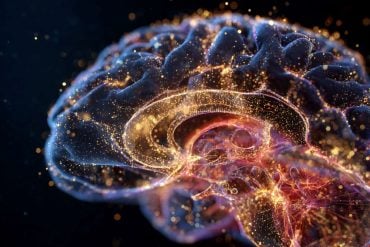Summary: A father’s diet before conception can impact his children’s health, particularly their susceptibility to metabolic diseases. The study, using data from the LIFE Child cohort and mouse models, revealed that paternal diet influences sperm RNA, affecting gene expression in offspring. This underscores the importance of paternal health in preventive care.
Key Facts:
- Father’s diet impacts children’s weight and metabolic disease risk via sperm RNA.
- Paternal high-fat diet in mice led to offspring with increased metabolic disease tendency.
- Preventive health care for prospective fathers, focusing on diet, could reduce disease risk in children.
Source: Helmholtz
Dr. Raffaele Teperino, head of the “Environmental Epigenetics” research group at Helmholtz Munich, along with his research team, has examined the impact of paternal diet on children’s health – specifically, the influence of diet before conception.
The researchers focused on special small RNA molecules in sperm, known as mitochondrial tRNA fragments (mt-tsRNAs, see background). These RNAs play a key role in the inheritance of health traits by regulating gene expression.

For their study, the researchers used data from the LIFE Child cohort, which includes information from over 3,000 families.
The analyses showed that the father’s body weight influences the weight of the children and their susceptibility to metabolic diseases.
This influence exists independently from other factors such as the mother’s weight, the parental genetics, or environmental conditions.
The Father’s Diet Influences the Children
To verify the results of their analysis, the research team subsequently conducted experiments with mice. These mice were fed a high-fat diet, meaning food with a higher fat content than a normal diet.
This had effects on the reproductive organs of the animals, including the epididymis. The epididymis is the area in the male reproductive system where freshly formed sperm mature.
“Our study shows that sperm exposed to a high-fat diet in the mouse epididymis led to offspring with an increased tendency to metabolic diseases,” says Raffaele Teperino.
To deepen the findings, the research team conducted additional studies in the laboratory. They created embryos through in-vitro fertilization (fertilization “in a test tube”).
When Teperino’s team used sperm from mice that had been exposed to a high-fat diet, they found mt-tsRNAs from these sperm in early embryos, significantly influencing gene expression. This, in turn, affects the development and health of the offspring.
“Our hypothesis that acquired phenotypes over the course of life, such as diabetes and obesity, are transmitted via epigenetic mechanisms across generations, is reinforced by this study. Here, epigenetics serves as a molecular link between the environment and the genome, even across generational boundaries.
“This occurs not only through the maternal line but, as our research results indicate, also through the paternal line,” explains Prof. Martin Hrabě de Angelis, co-author of this study and Research Director at Helmholtz Munich.
Preventive Health Care for Men Wishing to Become Fathers
The findings from the researchers at Helmholtz Munich underline the role of paternal health before conception – and offer new approaches to preventive health care: “Our results suggest that preventive health care for men wishing to become fathers should receive more attention and that programs should be developed for this purpose, especially with regard to diet,” says Teperino.
“This can reduce the risk of diseases like obesity and diabetes in children.”
Background: The Indirect Influence of Fathers
Mitochondria are often referred to as the powerhouses of the cell. They have their own DNA, independent of the DNA in the cell nucleus. This mitochondrial DNA (mt-DNA) produces proteins in the mitochondria via the intermediate mt-RNA and is typically inherited from mothers to offspring.
Previously, it was assumed that fathers had no part in the genetic makeup of their offspring’s mitochondria. However, recent studies like this one now show that sperm carry fragments of mt-RNA (“mt-tsRNA”) into the egg during fertilization.
The mt-tsRNAs play a role in epigenetics, regulating gene expression in the early embryo: they can indirectly influence the development and health of the offspring by modifying the activity of certain genes in the mitochondria.
Thus, fathers have an important, albeit indirect, influence on the genetic imprinting of mitochondria and thereby on the energy metabolism of their children.
About this diet and neurodevelopment research news
Author: Verena Coscia
Source: Helmholtz
Contact: Verena Coscia – Helmholtz
Image: The image is credited to Neuroscience News
Original Research: Open access.
“Epigenetic inheritance of diet-induced and sperm-borne mitochondrial RNAs” by Raffaele Teperino et al. Nature
Abstract
Epigenetic inheritance of diet-induced and sperm-borne mitochondrial RNAs
Spermatozoa harbour a complex and environment-sensitive pool of small non-coding RNAs (sncRNAs), which influences offspring development and adult phenotypes. Whether spermatozoa in the epididymis are directly susceptible to environmental cues is not fully understood.
Here we used two distinct paradigms of preconception acute high-fat diet to dissect epididymal versus testicular contributions to the sperm sncRNA pool and offspring health.
We show that epididymal spermatozoa, but not developing germ cells, are sensitive to the environment and identify mitochondrial tRNAs (mt-tRNAs) and their fragments (mt-tsRNAs) as sperm-borne factors. In humans, mt-tsRNAs in spermatozoa correlate with body mass index, and paternal overweight at conception doubles offspring obesity risk and compromises metabolic health.
Sperm sncRNA sequencing of mice mutant for genes involved in mitochondrial function, and metabolic phenotyping of their wild-type offspring, suggest that the upregulation of mt-tsRNAs is downstream of mitochondrial dysfunction.
Single-embryo transcriptomics of genetically hybrid two-cell embryos demonstrated sperm-to-oocyte transfer of mt-tRNAs at fertilization and suggested their involvement in the control of early-embryo transcription.
Our study supports the importance of paternal health at conception for offspring metabolism, shows that mt-tRNAs are diet-induced and sperm-borne and demonstrates, in a physiological setting, father-to-offspring transfer of sperm mitochondrial RNAs at fertilization.






